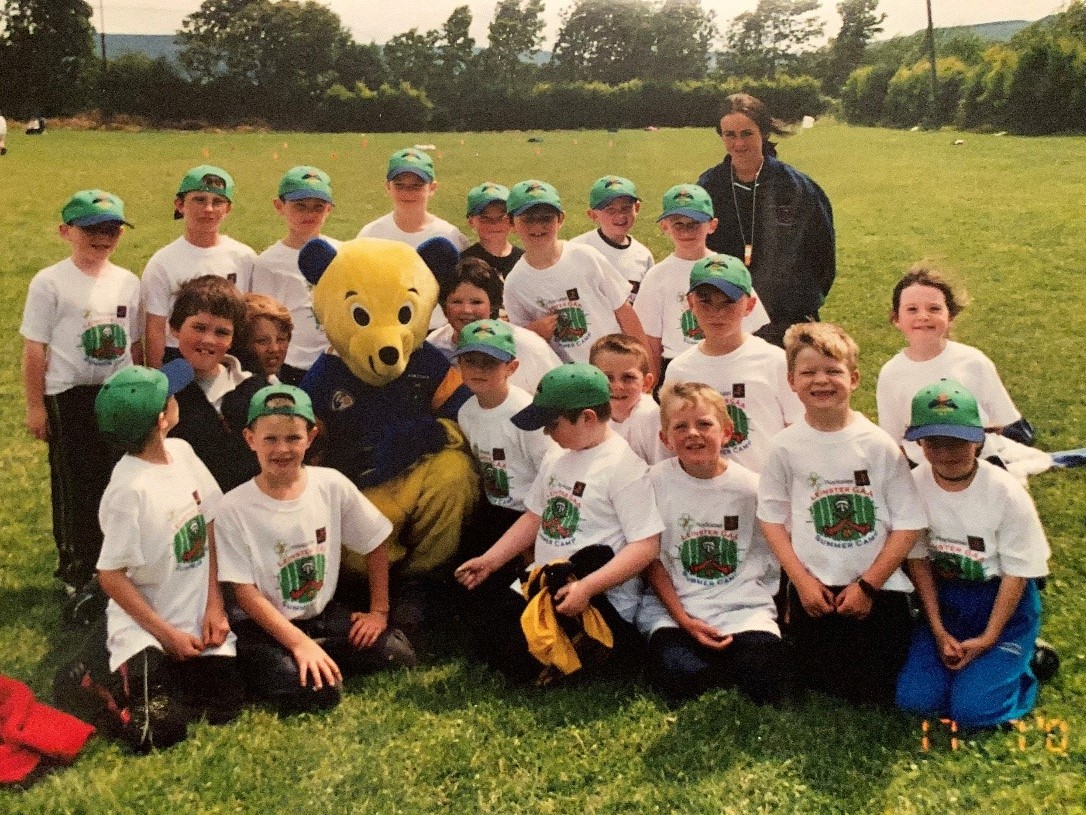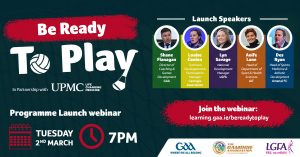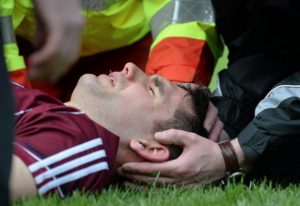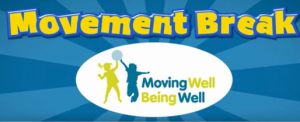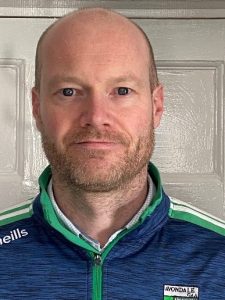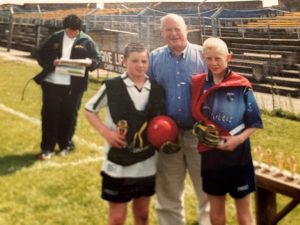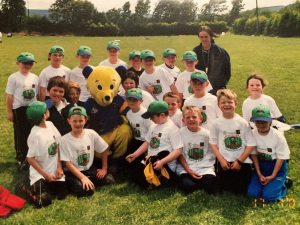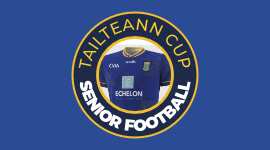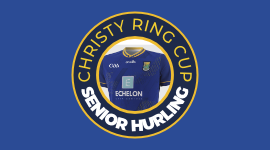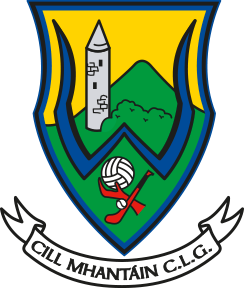Hope everybody is keeping safe and well as we prepare and interact with Coaching Courses, Webinars and Online training. As the evenings are getting brighter and some of our Players have returned to school. Its important that coaches start interacting with their club players. Planning & setting up drills & activities to keep all our players active is a major responsibility of our clubs. For our state of mind and mental health we need to be sending out training plans to all our players and holding Teams meeting to check in with everybody to see how they are progressing. It’s important that all players are completing some kind of individual /team sessions as we near a return to play.
GROUNDBREAKING ‘BE READY TO PLAY’ COACHING PROGRAMME LAUNCHED
THE GAELIC GAMES FAMILY LAUNCHED ‘BE READY TO PLAY’, A COACHING AND SPORT SCIENCE PROGRAMME IN ASSOCIATION WITH UPMC, OFFICIAL HEALTHCARE PARTNER OF THE GAA AND GPA, THAT WILL BE DELIVERED VIA WEBINARS, WEBSITE PROGRAMMES, INSTRUCTIONAL VIDEOS AND LIVE ONLINE SESSIONS. The programme is a holistic coaching and performance plan that will be of great benefit to all club coaches and players, male, female, adult, and youth alike. It will help them return to training post Covid in a way that will hopefully increase enjoyment, performance, and participation, while simultaneously reducing the risk of injury.
Areas covered will include games based coaching, athletic development, psychology and wellbeing, nutrition, performance analysis, skill acquisition and biomechanics, physiotherapy, and injury prevention.
This multi-disciplinary programme will be delivered by:
- Fortnightly Athletic Development Programmes. (Instructional Video & Live Sessions).
- Monthly Coach education webinars (Gaelic Games Coaching Experts & Guests).
- Monthly Sport Science support webinars (Every Sports Science Discipline covered)
Registration commenced on March 3rd for the “Be Ready to Play” initiative through the GAA eLearning site https://learning.gaa.ie/bereadytoplay
The site includes information on the following:
- Access to youth, adult and advanced athletic development programmes
- How to register for these programmes
- Launch webinar video
The first live educational webinar takes place on Tuesday March 16th at 7pm via Microsoft Teams. The title of the presentation from Helen McElroy is “Preparing to train and play. How to decrease your injury risk”
Our goal is to sign up as many Gaelic Games coaches and players as possible.
GAELIC GAMES CONCUSSION AWARENESS ELEARNING COURSE LAUNCHED
AN UPDATED GAELIC GAMES CONCUSSION AWARENESS ELEARNING COURSE HAS BEEN LAUNCHED THAT WILL HELP PLAYERS AND COACHES OF GAELIC GAMES (GAA, CAMOGIE AND LGFA) RECOGNISE THE SIGNS AND SYMPTOMS OF CONCUSSION AND UNDERSTAND BASIC PRINCIPLES OF MANAGEMENT.
By completing the course both players and coaches will have a greater understanding of the symptoms of concussion, how to manage and cope with concussion, and eventually return to play in a safe way by following the Gradual Return to Play Protocol. “Concussion is the same as any other injury, if you leave it untreated it’ll get worse, not better. But if you do go through the proper mechanisms you’ll get back to full health and there’s no reason why you can’t get back to play if you take your time and do things properly. “The course is designed for Gaelic Games in general. There can be subtle differences between concussions in females versus concussions in males, and there’s a specific section in the course that reflects that.” The updated Gaelic Games Concussion Awareness eLearning Course can be accessed on the GAA E-Learning site.
GAA LAUNCH MOVEMENT BREAK RESOURCES FOR CHILDREN
THE GAA ARE DELIGHTED TO LAUNCH A NEW SERIES OF MOVEMENT BREAK RESOURCES IN CONJUNCTION WITH THE MOVING WELL-BEING WELL (MWBW) INITIATIVE. AIMED AT FOUR TO 8-YEAROLD CHILDREN, THESE EVIDENCED-BASED AND DEVELOPMENTALLY SOUND VIDEOS AIM TO ENHANCE THEIR FUNDAMENTAL MOVEMENT SKILLS (FMS). To help meet the challenges of home schooling and no club activity, this set of video learning resources provide assistance to both primary teachers and parents to contribute to children’s physical activity needs. FMS are the ‘building block’ of more advanced sport-specific skills and are key to children being active later in life. Each video series concentrates on specific skills that include Two –handed catch, Vertical jump, Horizontal jump, Frog Jumps, Balance, Hop, Leap, One-hand catch, Skip and One-Hand strike and then theses skills are progressed to a slightly more difficult version of the same skill.
The MWBW Movement Break resources are the latest addition to a bank of children’s learning and physical activity resources that the GAA has produced in response to Covid-19 restrictions in collaboration with Cumann na mBunscol, the GPA, the LGFA and the Camogie Association. The #GAAPrimary Challenges are designed to help Primary Teachers and parents to work on the cross-curricular lesson plans with children. Gaelic game-themed lessons are across all curriculum subjects and are for children at every class level. These and other resources are available learning.gaa.ie/primaryschool.
CONDUCTING TRAINING SESSIONS
Planning and conducting practice sessions. It is important to continually stress to players that through practice sessions they will be taught skills and techniques that will lead to individual improvement, and that it is an opportunity for the team to develop into a cohesive offensive and defensive unit. As part of effective coaching, coaches should follow the ‘Plan – Act – Review’ strategy, which will set them on the correct path. Training activities may be planned to emphasise various components of the game, including skills and techniques and decision making and tactical thinking.
PRINCIPLES OF EFFECTIVE TRAINING
The coach needs to be aware of the general principles which ensure effective training. This makes it possible for coaches to formulate training programs and sessions which have a positive impact on both the team and individual. Coaches are able to design their training with appropriate consideration to the standard of the team.
Keep all players active: Maximise training time by keeping all players active and involved.
Give clear concise instructions: Learning improves when players know what is expected of them.
Demonstrations improve the accuracy of instructions; Vision & Correct Technique is paramount
Record progress: Certain drills allow measurement by which coaches and players can assess progress.
Give positive feedback: Emphasise and reward good performances.
Provide variety: Maintain interest by using various skills.
Encourage enjoyment: Training sessions should be fun and enjoyable.
Create progression: Learning improves if progression occurs from the simple to the complex.
Plan maximum use of resources: Ensure that you have the correct equipment (footballs, markers etc). A ratio of one football to two players is ideal.
Allow for individual differences: Allow for different learning rates among players.
Plan yet flexible: If a planned drill is not working or circumstances have changed react to the situation.
KEEP DRILLS AND ACTIVITIES SHORT
Shorter drills are more effective than lengthy ones. Unless practice time is pre-planned, drills may become long and boring to players and learning may be reduced. It is important to ensure players know the purpose of the drill being undertaken. Players tend to perform better when they know why they are working on a specific skill. The coach should also begin the session with a brief explanation of the session’s goals. This will give the session more direction and relevance and players will be clear on individual and team goals for the session.
DESIGNING THE TRAINING SESSION
Many of the problems which new coaches have at training have nothing to do with their personality, their level of control, or football knowledge, but are due to their lack of preparation before training. Deciding what drills to include and in what order is fundamental to achieving your objectives.
- Time spent in organising the training session will make the problem of controlling the group much easier.
- Observe your players during the drills, moving to individuals or groups that may need assistance.
- During each session, the coach should stand back and assess what is going well and what needs to be improved.
- Never stop the group until you are sure of what you are going to say. If the drill is going well, let it continue.
- Be clear in your instructions. If you want the players to finish the activity, use one clear word ‘stop’ or a whistle.
- Bring the group in. Before speaking make sure you can see all players, then direct your voice to the furthest person.
- If a demonstration is called for, group placement is most important. A single file, square, circle or semi-circle are all ideal learning formations.
- Keep instructions to a minimum by emphasising the main teaching points. Send the players back to practise.
- A skilful coach can judge when to stop a current activity and move on to the next drill. In most cases, it can be achieved with minimal disruption to the pattern of training.
- Take notes as soon as possible after training, listing the worthwhile drills and modifications to be made to existing drills.
PRACTICE DESIGN SHOULD INCORPORATE THE PRINCIPLES OF:
- FUN/Engaging
- Looks like the game
- Constant decision making
- Lots of pucks/touches
- Challenging
Quote of the week:
“Coaches have to watch for what they don’t want to see and listen to what they don’t want to hear.”– John Madden, American Football
Three Weekly Coaching Tips:
- Be open minded. Never say never.
- Be a role model for your players
- Accept constructive criticism as a positive. Learn from mistakes, take steps to improve from the experience and move on.
15 Coach Profile Questions
Name: Henry Cullen
Club: Avondale
Age Group You Coach: U12 & U13
- Would you change any of the GAA Playing Rules?
No – at underage level I believe the rules are clear and work well for the players. If anything, I would consider reducing the score from a free kick/puck back to one point.
- Why did you get involved in coaching?
I have always been involved with the club as a player and supporter, however when my 3 children started playing I drifted in to helping out as a coach.
- What is the most rewarding element of being a coach?
Seeing the children progress as players and developing an affiliation with the club.
- What advice would you give to young players?
Keep an eye out for role models and watch what they do on field.
- What resources do you use to assist you in your role?
The coaching workshops and seminars are excellent. Also, asking the current senior club players to get involved from time to time is very helpful.
- What does success look like to you?
Progressing enthusiastic and skilled juveniles through the age grades.
- What do you see as your three main responsibilities as a coach?
- Providing and enjoyable environment
- Developing the foundational skills
- Improving the affiliation with the club
- How important is winning to you? why?
Not of paramount importance at under-age however a level of success does keep the children positive about the games.
- You have 10 footballs & 10 cones in your coaching kit bag. You are in charge of 30 players how would you conduct training to maximise all equipment & player involvement?
We do a balance of 2 things – sort the players into smaller groups where each player is getting the most amount or touches as possible and secondly throw away 9 of the balls and 10 of the cones.
- What part of training or games do you dislike the most?
Monotonous drills.
- What does a normal coaching week look like for you and the team?
We are a dual club, so a week looks like balancing both codes, training and games.
- Why is planning your coaching sessions so important?
We find that if we are prepared and well planned there is less dead time during the coaching sessions.
- Why is feedback so important to player development?
Each child is progressing at a different level. Individual feedback is important to recognise this and help each child develop at their own pace.
- If one of your players are constantly overplaying the ball how do you get the player to correct this?
We use a scoring system in training that rewards passing and other skills in addition to goals & points.
- Explain how you have kept up to date with coaching methodologies and tactics?
I attend the forums and coaching webinars. I watch lots of games. At under-age level I don’t over think tactics rather focus on foundation skills and enjoyment.
You can contact us:
We also invite emails from Wicklow People readers if they would like any topic or area covered in more detail in our “Coach’s News” section. Coaches can email their queries and questions to hugh.kenny.gamesmanager.wicklow@gaa.ie and we can address them by providing the relevant information each week.
Few Old photos
Mark Kenny winner of The McDonalds Skill Challenge
2001 Tinahely Summer Camp
By wicklowpro Wed 10th Mar
